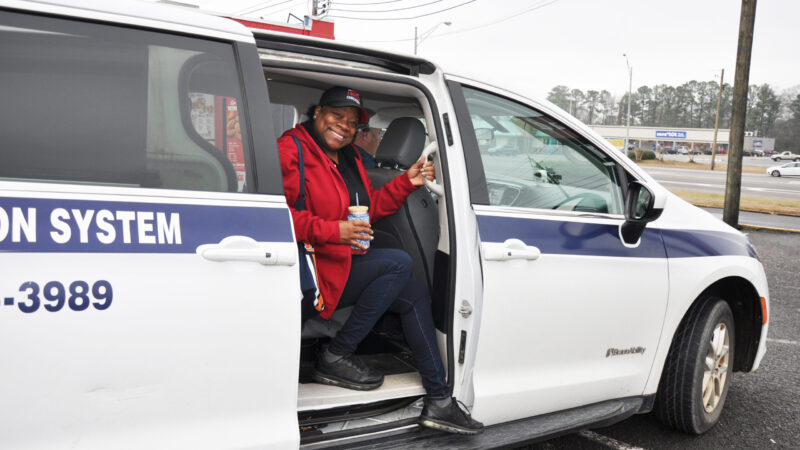SFS: Black on Black
“His name was Kenneth Arnett Washington. We called him ‘Tiger.’ And ‘Tiger’ was the first nephew that I diapered, that I took to Michigan State games, the Michigan state fair, to the Thanksgiving Day parades. And, you know, we miss him. We miss him still.”
“Tiger” had done some drugs and some time – in the streets and prison – but was on the rebound. He had started college and a family, but those plans were cut short.
“He was killed on the Westside of Detroit. (Tough neighborhood?) It’s a working class neighborhood. He was shot actually on the porch of a stranger. So we believe it was he and someone else that maybe robbery was involved. Don’t believe it was someone that he knew.”
Franklin, who left Birmingham for New York and Miami, now anchors and reports in Atlanta at Fox 5-TV. It was his nephew’s unsolved murder that led him to write a new book – a tutorial for young black men – called Give It All You Got: A Message to my Young Brothers.
Franklin says he doesn’t know the race of the person who shot “Tiger” that day. Odds are that person was black.
According to the Bureau of Justice Statistics, murderers are far likelier to kill
members of their own race: whichever race. Between 1976 and 2005, 86 percent of white victims were killed by other white people. In that same time, 94 percent of black victims were killed by blacks.
A problem some in the black community say belongs to everyone. Bishop Calvin Woods is president of the Birmingham chapter of the Southern Christian Leadership Conference.
“Many of our people as blacks seem to be committing what we can all ‘inhouse genocide’. Genocide is the destruction of a people. And it’s not the klan who is overtly trying seemingly to hurt us through acts of violence, but in many instances, it seems it’s we as blacks…”
But Woods says everyone must respond.
“Even though there’s overt black-on-black crime, the total community must share some responsibility for all of it. Because what affects one segment of one community will eventually affect the other.”
Eastern Michigan University criminologist Gregg Barack says it is a phenomenon that has roots in socioeconomics. Poor people — often blacks — are left behind in inner cities as wealthier people — often whites — flock to the suburbs. Home values decrease. Poor people stay poor… and stuck. Neighborhoods deteriorate and crime goes up. So-called ‘black-on-black crime.’
“The label itself is an expression of a racist culture.”
Barak, who also chaired the criminal justice department at Alabama State in the 80s and early 90s, says slogans such as black-on-black hide the underlying economic problem. ‘Black urban poverty’ he calls it. Crime is only part of a dire situation that’s getting worse.
But he’s conflicted.
“I mean, I don’t know what else you would call it. Do you want to bring attention to it or not?”
Barak’s argument doesn’t get much traction in news headlines or even in politics, where candidates talk very little about black urban poverty, but get very verbose about being tough on crime.
According to the FBI, in 2005, blacks made up about 50 percent of murder victims in the country, yet according to the United States Census that same year, they were about 13 percent of the population. Blacks were murdered six times more than whites.
A problem former Birmingham Police Chief Annetta Nunn says is front and center.
“In the past, you’d fight, you’d make up the next day. But now, it’s pick up a weapon and settle the score. And it’s not a video game, you don’t come back over and over again.”
Nunn was at the center of a firestorm for several years as the city’s top cop while murders were on the rise. Most of them in the black community. So she identifies with the term ‘black-on-black.’ But she says it’s not necessarily an economic issue.
“I say there are conditions of poverty that contribute to some of the lawlessness such as drug sales, etc., prostitution. But that does not cause crime.”
She says values transcend income bracket. She was the product of a poor neighborhood and she turned out to be police chief. Not a killer. Black-on-black violence, she says, should be addressed from all sides. And the term is real.
Franklin worries that the stigma the term creates drives a wedge between communities and people.
“Crime is crime. So often when we hear the term, I think it’s the type of thing where it becomes someone else’s problem. If you’re not in black America, or you’re in suburbs, and the way you look at black-on-black crime, ‘oh that’s them’.”
He says no matter the label, violence in any community is still senseless. It is unforgettable and cold and heartbreaking.
“The thing that matters, if someone has become a victim, they’ve become a victim. And it doesn’t matter if a white person took my nephew’s life or another black person took my nephew’s life, my nephew is gone.”
Yet another example of a crime that brings a problem – a human problem – to light.
Kalshi reveals insider trading case against editor for MrBeast
With prediction markets booming, so have concerns about insider trading. Now, Kalshi has disclosed its first public actions against accounts suspected of trading on confidential information.
Greetings from Jordan’s Wadi Rum desert, where patches of green emerge after winter rains
Wadi Rum's otherworldly landscape is where Star Wars movies and The Martian were filmed. In late winter, plants emerge in this desert — but some are toxic to camels, so their herders must protect them.
Lack of transportation keeps many Alabamians from working. Rural public transit programs are trying to help
While lack of transportation is a major employment barrier in Alabama, few people take public transit to work. That dynamic is even more pronounced in rural areas.
When a horse whinnies, there’s more than meets the ear
A new study finds that horse whinnies are made of both a high and a low frequency, generated by different parts of the vocal tract. The two-tone sound may help horses convey more complex information.
Hundreds of American nurses choose Canada over the U.S. under Trump
More than 1,000 American nurses have successfully applied for licensure in British Columbia since April, a massive increase over prior years.
Trump’s many tariff tools mean consumer prices won’t go down, analysts say
The Supreme Court struck down President Trump's signature tariffs. But the president has other tariff tools, and consumers shouldn't expect cheaper prices anytime soon, economists say.






